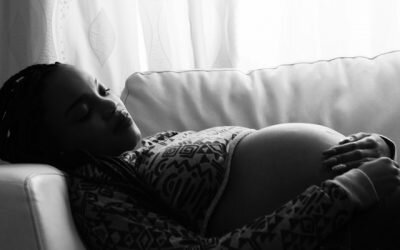Frontline NHS doctors answer common questions on everything from antenatal care to cancelled home births
Frontline doctors have answered common questions on how coronavirus might affect pregnancy and birth in a bid to put expectant mothers’ minds at ease.
Dr Larisa Corda, a gynaecologist and obstetrician in London, and Dr Hannah Froud, who works at an Essex hospital, have revealed what women can expect from the experience.
They have addressed a wide range of topics – from cancelled home births to procedures around hospital admissions in labour – in a Q&A for Femail…
Will I be allowed a birthing partner when I go into labour?

Women should prepare a back-up birthing partner who can help them through the intensity of labour if their first choice gets sick, according to Dr Corda.
She said: ‘Pregnant women are still allowed to have a single birth partner during the crisis, but the partner must be well and not show signs of coronavirus.
‘If he or she does, they will sadly not be allowed on to labour ward because of the risk of transmitting infection to other labouring women and also staff.’
And most trusts are only allowing partners into the ward during ‘active labour’ – from when the woman is 3-4cm dilated.
‘The reason for this is that the first phase, called the latent phase, can sometimes last several hours or even days, and therefore to minimise risk of infection being transmitted around the ward, partners will not be allowed to accompany during this time,’ she added.
‘This sadly also includes inductions of labour, where the process of starting labour can take a long time in some cases.
‘All maternity units recognise the absolute need for women to have birth partners with them during labour.’
But some units have banned partners altogether if the mother is admitted antenatally, before birth, or postnatally, afterwards.
Will I be tested for coronavirus on admission to hospital?
Pregnant women are not being routinely tested for coronavirus, Dr Froud revealed, but they ‘will be tested on the same basis as anyone else’.
Dr Corda confirmed this means if a pregnant woman has coronavirus symptoms they will be tested to ensure the safety of the midwife and others.
She added that if the woman develops sepsis in labour they’ll also be tested.
‘The reason for this is that when someone is asymptomatic, there is very little benefit of testing them for the virus,’ she said.
Dr Froud suggested this policy could change as the situation develops.
Read the full article here.












































